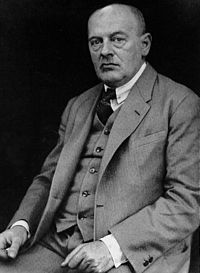Max Scheler Philosopher
Max Ferdinand Scheler (German: [ˈʃeːlɐ]; August 22, 1874 – May 19, 1928) was a German philosopher known for his work in phenomenology, ethics, and philosophical anthropology. Scheler developed further the philosophical method of the founder of phenomenology, Edmund Husserl, and was called by José Ortega y Gasset "the first man of the philosophical paradise." After his death in 1928, Martin Heidegger affirmed, with Ortega y Gasset, that all philosophers of the century were indebted to Scheler and praised him as "the strongest philosophical force in modern Germany, nay, in contemporary Europe and in contemporary philosophy as such." In 1954, Karol Wojtyła, later John Paul II'>Pope John Paul II, defended his doctoral thesis on "An Evaluation of the Possibility of Constructing a Christian Ethics on the Basis of the System of Max Scheler."
Search
Philosopher
| influenced | |
|---|---|
| influenced by | |
| notable idea | |
| philosophical school |
Max Scheler on Wikipedia
External resources
- http://www.max-scheler.de
- http://www.maxscheler.com
- http://www.phenomenologycenter.org/gallery2.htm
- http://www.webcitation.org/query?url=http://www.geocities.com/MaxSchelerBrasil&date=2009-10-25+09:11:47
- https://archive.org/stream/monistquart12hegeuoft#page/632/mode/2up
- https://archive.org/stream/naturelond63londuoft#page/438/mode/1up
